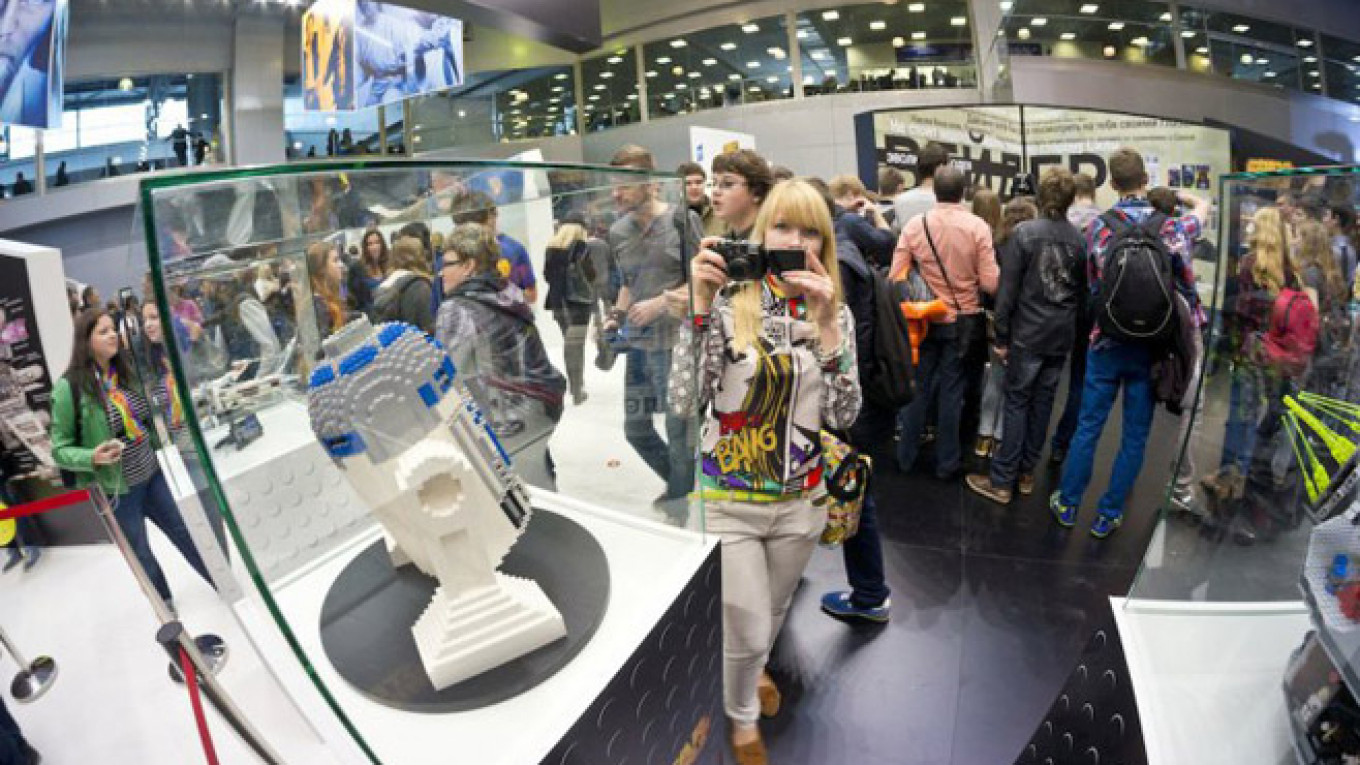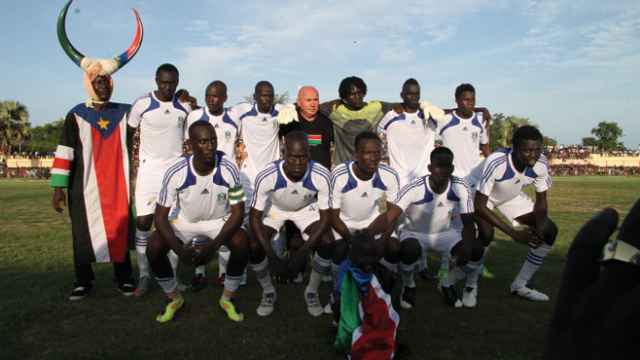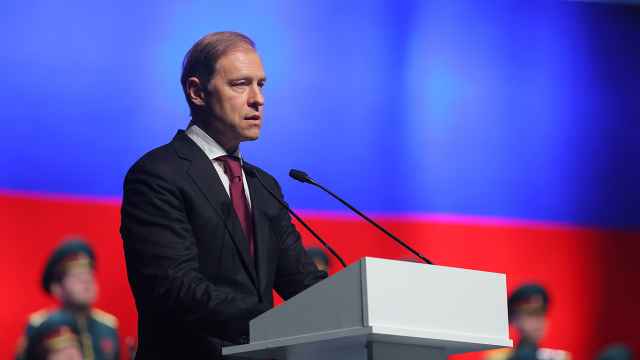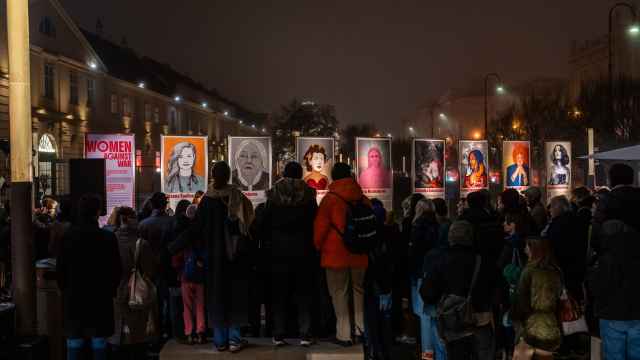Russia's first annual Comic Con has a genuine armored tank, but surprisingly few comics.
It is still a geek's paradise: Tables groan under the weight of steampunk merchandise, solemn-faced cosplayers ("costume+play") of both sexes pose for photographers, giant screens blast video game ads, and a genuine Soviet lunar rover huddles modestly in the corner.
But actual comic booths take up only a minuscule portion of the floor space, and are dwarfed by the Star Wars and Nintendo pavilions, where Russians can finally take a selfie with Darth Vader.
See the Photo Gallery: Thousands Attend Russia's First Comic-Con
Even the tank parked outside Moscow's Crocus Expo center, which housed the event last week, is there to advertise a new multiplayer tank simulator whose developers in Russia have a habit of collaborating with actual tank makers.
And yet this is still a breakthrough for the "funny pictures": Just a few years ago, a Comic Con in Russia would have been impossible because nobody read comics.
It took Russia's comic book culture two decades to overcome the Soviet-era stigma that placed "serious literature" on a pedestal at the expense of disdained mass culture.
But a domestic comic industry is finally taking shape, and generating the first Russian superheroes to rival Batman and Wolverine — because the nation is finally learning to appreciate a good story, experts and enthusiasts say.
In Soviet Russia, Comics Read You
It would be wrong to call Russia a comics-virgin.
As early as the 17th century, prints featuring pictures and text delivering simple, ironic, educational, religious or historical narratives, known as "lubok," were available at any local market in pre-revolutionary Russia.
Posters trumpeting the triumph of workers over the bourgeoisie, or praising the war effort that the Bolshevik government was fond of — many of which comprised several panels — also qualified as early comics.
The format was also embraced by satirists, as evidenced by the sweeping popularity of Danish artist Herluf Bidstrup (1912-1988). Many Soviet satirical magazines ran caricatures indistinguishable from Western newspaper comic strips — in format, if not in message.
Neither, however, evolved into the lengthy, serialized adventure narratives that make up American, French and Japanese comics.
Longer Russian comic strips were relegated to children's magazines, which began to serialize these animated adventures as early as the 1960s. One of the most popular such magazines was actually titled "Funny Pictures" ("Vesyoliye Kartinki").
But the format remained on the fringes, and was limited to preteen audiences because of the "literature-centric" nature of the Soviet culture, modern art expert Alexander Borovsky of St. Petersburg's Russian Museum argued in an article in the 2010 anthology "The Russian Comic."
Any form of "low-brow entertainment" was relegated to the children's domain, said Daniel Trabun, editor-in-chief of leading Russian lifestyle magazine Afisha and comic book aficionado.
Adults, whether readers or aspiring creators, were supposed to stick to "serious literature," which stunted the development of mass culture — including the adoption of new formats, he said.
The Tables Have Turned
Cultural elitism began to buckle after the fall of the Soviet Union, when Hollywood films, translated pulp fiction and pop and rock music swept into entertainment-starved Russia.
But there was still no place for comics on the list. Trailblazers' first attempts to draw, translate sell and/or promote graphic novels repeatedly fizzled out through most of the 1990s and 2000s.
But some caught on, such as the annual ComMission comic book festival, which has been held in Moscow since 2002, and the situation began to turn in the 2010s, industry players say.
As of this year, there are four comic book stores in Moscow alone, and many bookstore chains have set up comic-book sections.
No estimates are available for the Russian comic industry beyond the fact that it is tiny. But a burgeoning young industry finally exists, said Vasily Shevchenko, co-founder of the Chook & Geek comic book store in Moscow, which opened in 2010.
The store sells 3,000-5,000 books a month, mostly Russian translations of Western superhero series, said Shevchenko, who personally translated into Russian Art Spiegelman's "Maus," a Pulitzer-winning graphic novel about the Holocaust that proved seminal following its 1991 release in changing Western attitudes toward the genre.
"The main problem was simply that there was no industry, no infrastructure," Shevchenko, a bespectacled, bearded, intelligent-looking man in his 30s, said about the slow rise of comic-book culture in Russia.
"And building those from the scratch takes a long time in any sphere," he said.
Post-Soviet Geeks
The adoption of comics in Russia also gave rise to a young, new audience: The bulk of today's comic book geeks belong to the "first post-Soviet generation," born after 1991, Shevchenko said.
He gave an interview to The Moscow Times in fits and starts while manning his store's stand at Comic Con, continually interrupted by his teen clientele shyly asking for prices of the latest Batman books.
"I just like comics. I simply do. I read books too, but it's easier to follow a story if it has illustrations," said one customer, a stocky blond geodesy student who identified himself as Konstantin.
He said his favorite superhero was Batman "because he's funny," and freely admitted to having an odd sense of humor.
His interest in comics raises no eyebrow among fellow students, some of whom share the hobby, added Konstantin, who, indeed, attended the convention in the company of a male buddy.
Red Fury & Major Thunder
The strongest testament to the rise of Russia's comic industry is probably the fact that for the past two years, it has been generating homegrown rivals for Superman and his U.S. ilk.
So far, they are four: Hooded war vet-turned-vigilante Besoboi ("Demon Fighter"); time-traveling, family curse-fighting Inok ("The Friar"); public favorite Mayor Grom ("Major Thunder") — Russia's best, most honest and hard-working cop — and Krasnaya Furiya ("The Red Fury"), who is buxom, mischievous and looking for the Holy Grail so the Nazis won't get it.
Each has a monthly series, and two more characters are on the cards, said Artyom Gabrelyanov, the head of Bubble, the company that makes and publishes Russia's first serialized adventure comics.
Bubble's products are available not just in comic and book stores, but also from vending machines in the Russian metro, which, at 7.5 million daily passengers, is a powerful promotion tool for any product.
The stories have a print run of between 3,000 and 20,000 per issue, Gabrelyanov said.
Given an issue's standard price of 50 rubles ($1.25), this indicates monthly revenues between $15,000 and $100,000, not counting electronic sales. By comparison, Chook & Geek store's average monthly income, though not publicly disclosed, can be estimated at around $15,000 to $30,000, based on prices, stock and sales information available.
Fellow industry representatives were reserved about the artistic value of Bubble's produce, noting that it is still sticking faithfully to Western templates.
But all praised the company's effort in promoting the medium — though Shevchenko said it might have been boosted by the personal connections of Gabrelyanov, the son of controversial pro-Kremlin tabloid magnate Aram Gabrelyanov.
Bubble's stories differ from Western analogues in realism, Gabrelyanov Jr. told The Moscow Times.
"These days, if you write that someone gained superhero powers through the bite of a radioactive spider, people'll just laugh," he said, referring to the famous story of Spiderman's origins.
But he promised "more superhero stuff" in further installments of Bubble's comics.
Good Stories & Old Values
Gabrelyanov's interest in comics may be seen as going against the Kremlin's general policy of eschewing Western ties and influences, none the least because of their cultural "alienness" to the allegedly traditionalist Russia.
Lawmakers and pro-Kremlin media have lately been lambasting Russian versions of foreign glossy magazines for their "subversive" cultural influence. Gabrelyanov Sr. is also actively involved in West-bashing, though — admittedly — for political, not cultural reasons.
But Artyom Gabrelyanov — a buff, animated and outspoken young man — dismisses all speculation that comics may be alien or harmful to Russia.
"We get loonies like that commenting on our website once every few months, but we just ban them," he said on the sidelines of Comic Con Russia.
"Comics are simply a good story," Gabrelyanov said. "Everyone likes a good story."
Contact the author at [email protected]
A Message from The Moscow Times:
Dear readers,
We are facing unprecedented challenges. Russia's Prosecutor General's Office has designated The Moscow Times as an "undesirable" organization, criminalizing our work and putting our staff at risk of prosecution. This follows our earlier unjust labeling as a "foreign agent."
These actions are direct attempts to silence independent journalism in Russia. The authorities claim our work "discredits the decisions of the Russian leadership." We see things differently: we strive to provide accurate, unbiased reporting on Russia.
We, the journalists of The Moscow Times, refuse to be silenced. But to continue our work, we need your help.
Your support, no matter how small, makes a world of difference. If you can, please support us monthly starting from just $2. It's quick to set up, and every contribution makes a significant impact.
By supporting The Moscow Times, you're defending open, independent journalism in the face of repression. Thank you for standing with us.
Remind me later.







